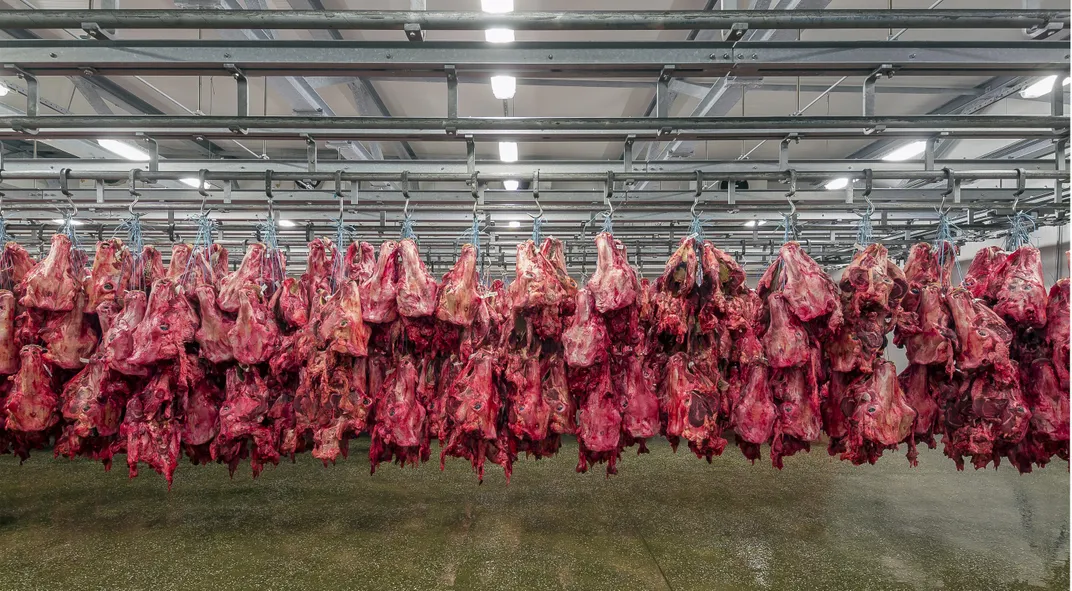Raising Beef Uses Ten Times More Resources Than Poultry, Dairy, Eggs or Pork
If you want to help the planet but can’t bring yourself to give up meat entirely, eliminating beef from your diet is the next-best thing
/https://tf-cmsv2-smithsonianmag-media.s3.amazonaws.com/filer/cb/cc/cbccb230-07e5-40f9-a136-6f9be7e4ff74/beef1.jpg)
There are several reasons to give up meat, eggs and dairy. For starters, there’s the ethical argument: animals born into the livestock industry often spend their entire existence crammed into overcrowded cages, and they fall victim to mutilation and other forms of cruelty prior to being culled. There’s also the human health argument: Giving up meat—especially beef—can help lower cholesterol intake.
And then there’s the environmental side of things. Researchers estimate that livestock-based food production causes about one-fifth of all global greenhouse gas emissions. It also sucks up water and land for growing crops to feed livestock and for raising those animals.
While ceasing to eat meat altogether may be the best choice for the planet, many people aren’t willing to do this. Some, instead, choose to limit the meat and animal product portion of their diets, eating only poultry, for example, or only eggs and dairy.
But no one had actually broken down all of the various livestock categories in a standardized, whole-picture way to figure out each one’s individual contribution to global warming. While it seems obvious that a cow contributes more greenhouse gas emissions than a chicken, putting an exact figure on those various animals can lend clarity for both policy makers and consumers looking to curb their own emissions.
Researchers from Bard College, the Weizmann Institute of Science and Yale University took on this task in a new paper published in Proceedings of the National Academy of Sciences. They focused on animals in the U.S. food production system.
First, the researchers calculated the feed costs for each class of animal—beef, pork, chicken, laying hens and dairy cows. They did not include fish because data about resources used to raise those animals is limited, and fish only contributed about two percent of American’s animal-based energy intake from 2000 to 2013.
They used data collected between 2000 to 2010 from the U.S. Departments of Agriculture, Interior and Energy about land area, water and nitrogen fertilizer to determine the burden produced by feeding and raising all of those animals. Then, they standardized the data by calories contained in a given amount of milk, eggs, beef, pork or chicken.

The findings, while expected, are quite sobering. Pork, chicken, dairy and eggs are equivalent within a factor of two when it came to their environmental burdens, the authors determined. But beef requires far, far more resources than any of those other protein categories. The team calculated that beef requires 28 times more land, six times more fertilizer and 11 times more water compared to those other food sources. That adds up to about five times more greenhouse gas emissions.
To further put these findings into perspective, the authors also ran the same calculations for several staple crops. All told, on a calorie-to-calorie basis, potatoes, wheat and rice require two to six time less resources to produce than pork, chicken, eggs or dairy.
The authors acknowledge that their calculations are not perfect, but say that they believe their results provide sound initial figures that consumers can use to help make decisions about their diet. “The key conclusion—that beef production demands about one order of magnitude more resources than alternative livestock categories—is robust under existing circumstances,” the authors conclude. “The study thus elucidates the multiple environmental benefits of potential, easy-to-implement dietary changes, and highlights the uniquely high resource demands of beef.”
In other words, while shifting to a livestock-free diet does the most good for the planet, just giving up beef is an effective compromise for those looking to curb their environmental impacts without completely sacrificing the joys of eating animal flesh.
/https://tf-cmsv2-smithsonianmag-media.s3.amazonaws.com/accounts/headshot/Rachel-Nuwer-240.jpg)
/https://tf-cmsv2-smithsonianmag-media.s3.amazonaws.com/accounts/headshot/Rachel-Nuwer-240.jpg)